Automation with JUnit
Test reference in Squash TM
In order to bind a Squash TM test case to a JUnit automated test, the content of the Automated test reference field of the Automation block of a test case must have the following format:
[1] / [2] # [3]
With:
-
[1]: Name of the project on the source code repository. -
[2]: Qualified name of the test class. -
[3]: Name of the method to test in the test class. This parameter is optional.
Below is an example of a test class and the corresponding Squash TM test case automation:
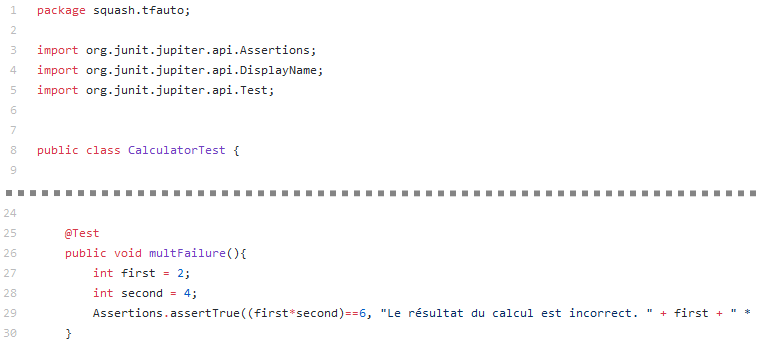
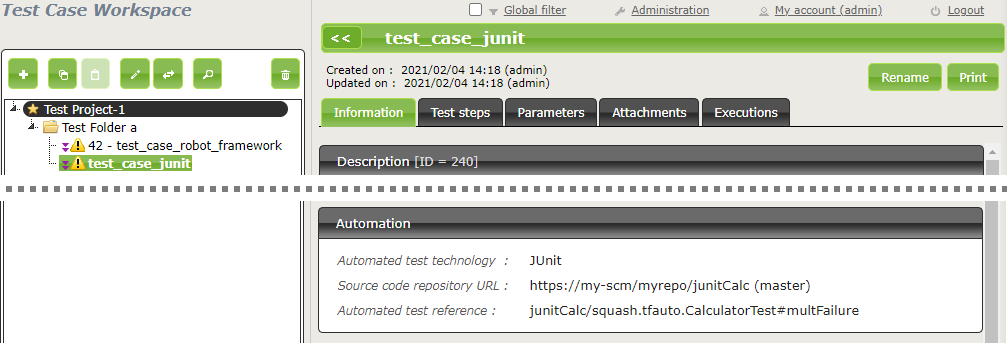

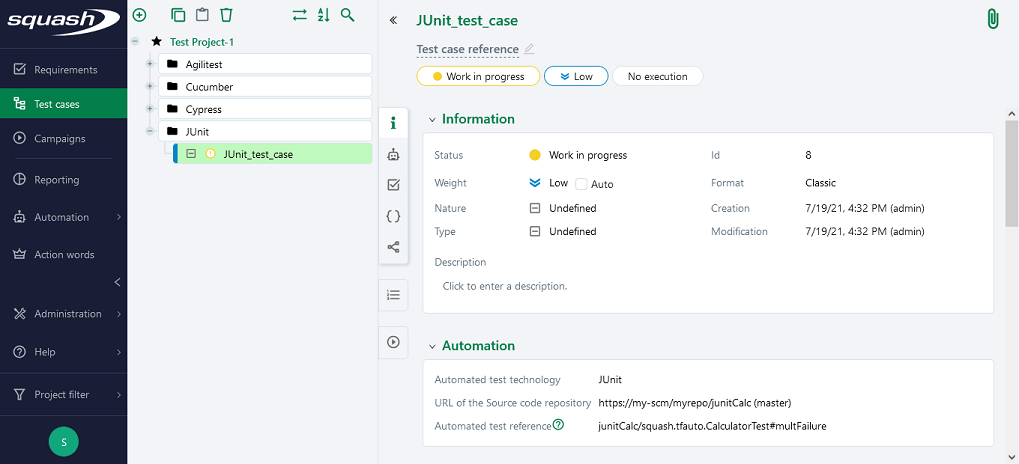
JUnit 5
JUnit 5 is a very rich test framework and offers a large combination of possible configurations.
Squash Orchestrateur uses mvn test -Dtest=testclass#testmethod to run each test.
If you are using the JUnit 5 platform in a simple way, this command line works.
Example 1:
pom.xml file to run tests written in JUnit 5:
<project>
<modelVersion>4.0.0</modelVersion>
<groupId>…</groupId>
<artifactId>…</artifactId>
<version>…</version>
<dependencies>
<dependency>
<groupId>org.junit.jupiter</groupId>
<artifactId>junit-jupiter-engine</artifactId>
<version>5.8.2</version>
<scope>test</scope>
</dependency>
<dependency>
<groupId>org.junit.jupiter</groupId>
<artifactId>junit-jupiter-api</artifactId>
<version>5.8.2</version>
<scope>test</scope>
</dependency>
</dependencies>
<build>
<plugins>
<plugin>
<groupId>org.apache.maven.plugins</groupId>
<artifactId>maven-surefire-plugin</artifactId>
<version>2.22.2</version>
</plugin>
</plugins>
</build>
</project>
Example 2:
pom.xml file to run tests written in JUnit 4 (in a JUnit 5 environment):
<project>
<modelVersion>4.0.0</modelVersion>
<groupId>…</groupId>
<artifactId>…</artifactId>
<version>…</version>
<dependencies>
<dependency>
<groupId>org.junit.vintage</groupId>
<artifactId>junit-vintage-engine</artifactId>
<version>5.8.2</version>
<scope>test</scope>
</dependency>
</dependencies>
</project>
If you are using a more complex configuration, for example with junit-platform-surefire-provider or with junit-platform-runner, please check that mvn test -Dtest=testclass#testmethod works.
Nature of the exploitable Squash TM parameters
The exploitable Squash TM parameters in a JUnit script will differ depending on whether you're using the Community or Premium version of Squash DEVOPS.
Here is a table showing the exploitable parameters (these parameters are transmitted as test parameters, see below, Squash TM does not generate global parameters):
| Nature | Key | Community | Premium |
|---|---|---|---|
| Name of the dataset | DSNAME | ✅ | ✅ |
| Dataset parameter | DS_[name] | ✅ | ✅ |
| Test case reference | TC_REFERENCE | ✅ | ✅ |
| Test case custom field | TC_CUF_[code] | ✅ | ✅ |
| Iteration custom field | IT_CUF_[code] | ❌ | ✅ |
| Campaign custom field | CPG_CUF_[code] | ❌ | ✅ |
| Test suite custom field | TS_CUF_[code] | ❌ | ✅ |
Legend:
[code]: Value of the "Code" of a custom field[name]: Parameter name as filled in Squash TM
As indicated, Squash TM adds a prefix to the code of the transmitted custom field. Make sure to take it into account.
Refer to the Squash TM documentation for more information about custom fields.
Parameters usage
It is possible, when running JUnit tests, to exploit parameters within it. A parameter can be a test parameter or a global parameter. Squash TM transmits only test parameters. Test parameters and global parameters can be used in Squash DevOps with the junit/params action.
To do this, the following steps must be followed:
-
Import opentestfactory-java-param-library into the Maven project containing the tests to run by adding to the
pom.xmlfile:- the following Maven repository:
<repositories> <repository> <id>org.squashtest.repo.release</id> <name>Squashtest repository for releases</name> <url>https://nexus.squashtest.org/nexus/repository/maven-squashtest-public-releases/</url> </repository> </repositories>- the following Maven dependency:
<dependencies> <dependency> <groupId>org.opentestfactory.util</groupId> <artifactId>opentestfactory-java-param-library</artifactId> <version>1.0.2</version> </dependency> </dependencies> -
You can then retrieve the value of a parameter of the desired type using the following syntax:
ParameterService.INSTANCE.getString("paramName"); ParameterService.INSTANCE.getInt("paramName"); ParameterService.INSTANCE.getFloat("paramName"); ParameterService.INSTANCE.getDouble("paramName"); ParameterService.INSTANCE.getBoolean("paramName");The above methods look for the desired parameter in the test parameters; if they cannot find it, they then look for it in the global parameters.
These methods throw aParameterNotFoundExceptionif the parameter is not found. If the parameter is found but cannot be converted to the desired type, aParameterFormatExceptionis thrown. Consider handling these exceptions in your test classes.
Warning: the conversion of Boolean data returnstruewhen the character string to be converted is equal to"true"(whatever the case),falsein all other cases; but never propagates an exception. -
It is also possible to define a default value in the case where the parameter does not exist by using the following syntax:
ParameterService.INSTANCE.getString("paramName", defaultValue); ParameterService.INSTANCE.getInt("paramName", defaultValue); ParameterService.INSTANCE.getFloat("paramName", defaultValue); ParameterService.INSTANCE.getDouble("paramName", defaultValue); ParameterService.INSTANCE.getBoolean("paramName", defaultValue);The above methods therefore do not propagate a
ParameterNotFoundExceptionwhen the parameter sought is not found but propagate aParameterFormatExceptionif the parameter is found, but cannot be converted to the desired type. -
It is also possible to target a test parameter or a global parameter with specific methods. As with the previous methods, they are available in versions with and without default values. Here are a few examples:
ParameterService.INSTANCE.getTestString("paramName"); ParameterService.INSTANCE.getGlobalInt("paramName"); ParameterService.INSTANCE.getTestFloat("paramName", defaultValue); ParameterService.INSTANCE.getGlobalBoolean("paramName", defaultValue);
Example
Below is an example of a JUnit test file and the automation of the associated Squash TM test case:
package squash.tfauto;
import org.junit.jupiter.api.Assertions;
import org.junit.jupiter.api.Test;
import org.opentestfactory.exception.ParameterException;
import org.opentestfactory.exception.ParameterFormatException;
import org.opentestfactory.util.ParameterService;
public class ParameterTest {
@Test
public void sub() throws ParameterException {
int var1 = ParameterService.INSTANCE.getInt("DS_VAR1");
int var2 = ParameterService.INSTANCE.getTestInt("DS_VAR2");
int res = ParameterService.INSTANCE.getTestInt("DS_RES");
Assertions.assertEquals(res, var1 - var2, "Wrong calculation result");
}
@Test
public void add() throws ParameterFormatException {
float var1 = ParameterService.INSTANCE.getFloat("DS_FAKE_VAR1", 42.21f);
float var2 = ParameterService.INSTANCE.getTestFloat("DS_FAKE_VAR2", 15.23f);
float res = ParameterService.INSTANCE.getTestFloat("DS_FAKE_RES", 57.44f);
Assertions.assertEquals(res, var1 + var2, "Wrong calculation result");
}
@Test
public void displayLabel() throws ParameterException {
Boolean isDisplay = ParameterService.INSTANCE.getBoolean("DS_DISPLAY");
String label = "default";
if (isDisplay) {
label = ParameterService.INSTANCE.getString("TC_CUF_LABEL");
}
Assertions.assertEquals("Squash", label, "Wrong label displayed");
}
}
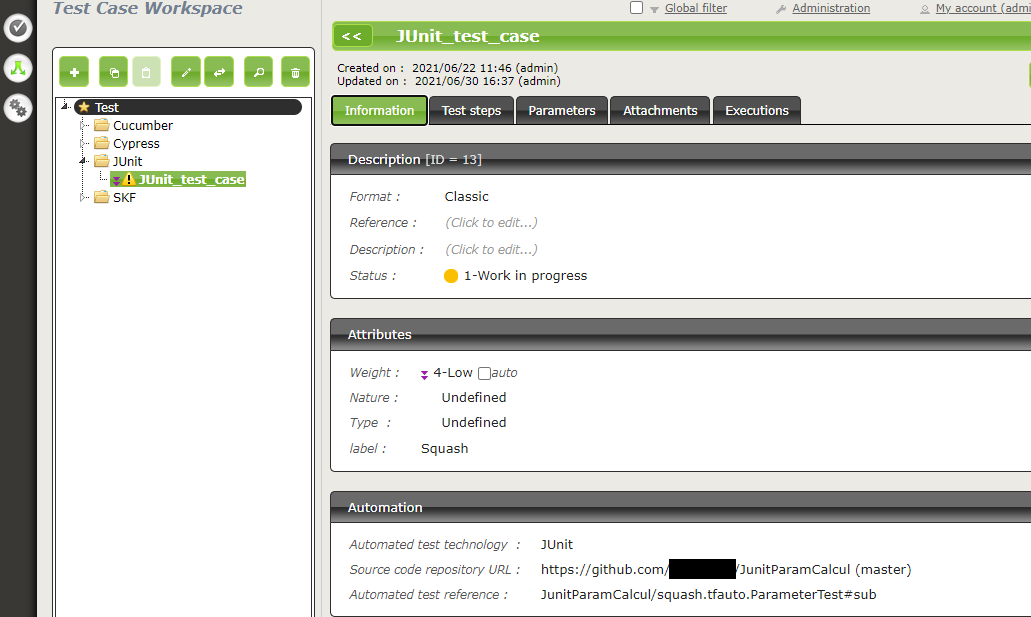
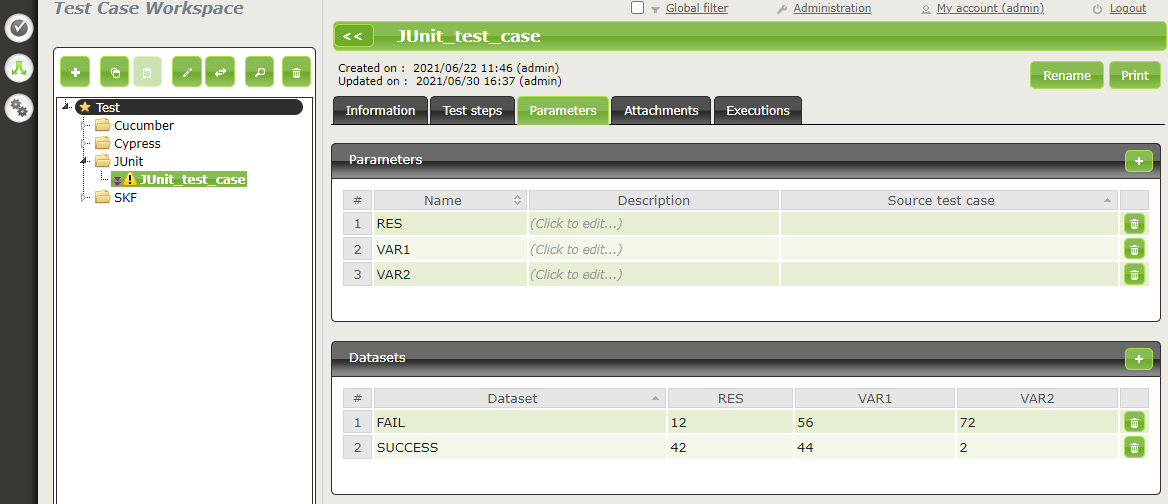
package squash.tfauto;
import org.junit.jupiter.api.Assertions;
import org.junit.jupiter.api.Test;
import org.opentestfactory.exception.ParameterException;
import org.opentestfactory.exception.ParameterFormatException;
import org.opentestfactory.util.ParameterService;
public class ParameterTest {
@Test
public void sub() throws ParameterException {
int var1 = ParameterService.INSTANCE.getInt("DS_VAR1");
int var2 = ParameterService.INSTANCE.getTestInt("DS_VAR2");
int res = ParameterService.INSTANCE.getTestInt("DS_RES");
Assertions.assertEquals(res, var1 - var2, "Wrong calculation result");
}
@Test
public void add() throws ParameterFormatException {
float var1 = ParameterService.INSTANCE.getFloat("DS_FAKE_VAR1", 42.21f);
float var2 = ParameterService.INSTANCE.getTestFloat("DS_FAKE_VAR2", 15.23f);
float res = ParameterService.INSTANCE.getTestFloat("DS_FAKE_RES", 57.44f);
Assertions.assertEquals(res, var1 + var2, "Wrong calculation result");
}
@Test
public void displayLabel() throws ParameterException {
Boolean isDisplay = ParameterService.INSTANCE.getBoolean("DS_DISPLAY");
String label = "default";
if (isDisplay) {
label = ParameterService.INSTANCE.getString("TC_CUF_LABEL");
}
Assertions.assertEquals("Squash", label, "Wrong label displayed");
}
}
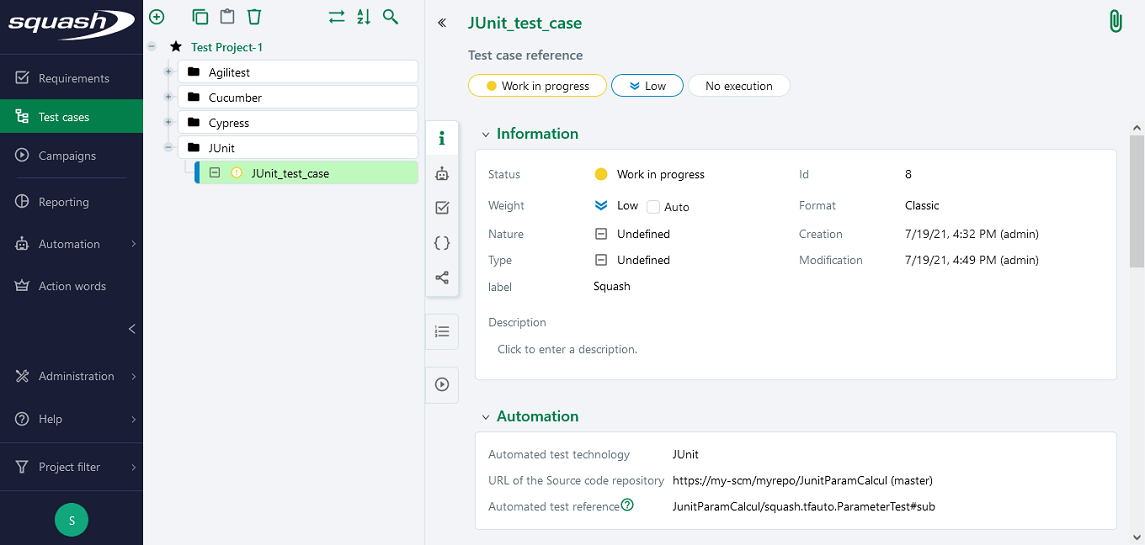
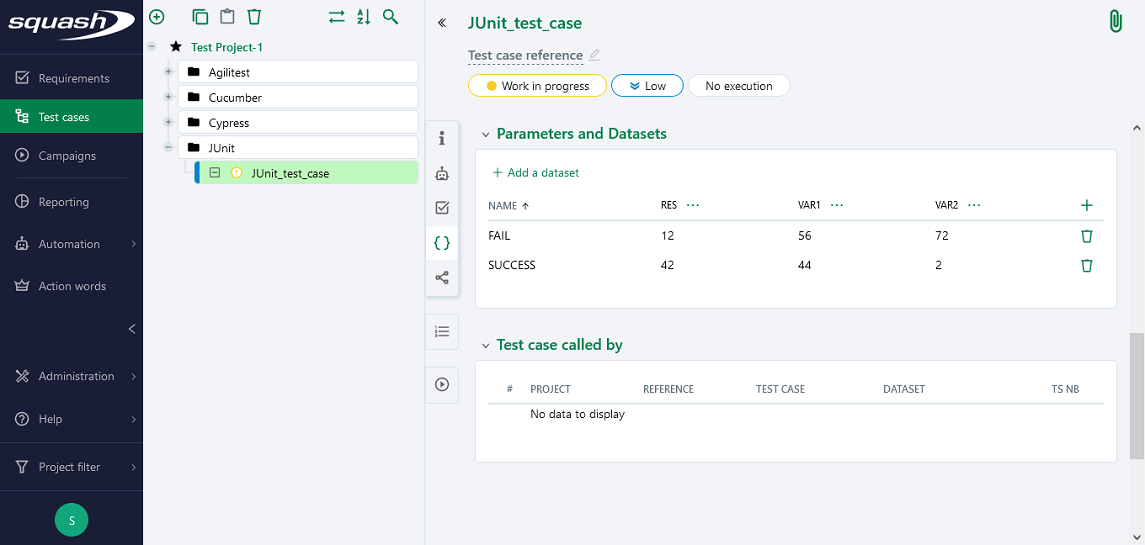
Supported versions
Squash AUTOM and Squash DEVOPS have been validated with
- JUnit 4.12, any JUnit 4 version more recent should work properly
- JUnit 5.3.2, any JUnit 5 version should work properly
Additionally, it is advised to use Surefire 2.19.1 or later.